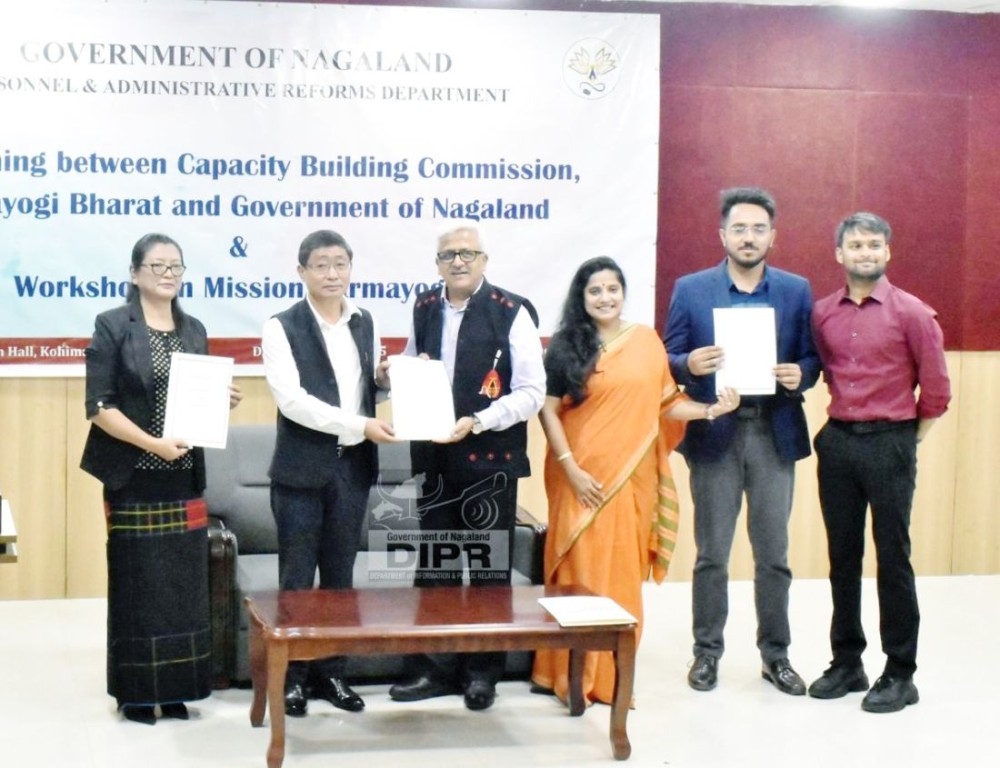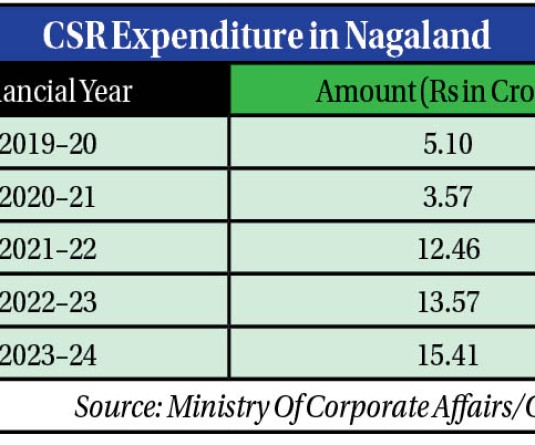Nagaland Chief Secretary, Sentiyanger Imchen with Dr Balasubramaniam, Member-HR, Capacity Building Commission and others during the singing of MoU. (DIPR Photo)

Kohima, October 8 (MExN): The signing of the Memorandum of Understanding (MoU) between Capacity Building Commission, Karmayogi Bharat and Government of Nagaland, and a workshop on Mission Karmayogi organised by the Department of Personnel & Administrative Reforms, Government of Nagaland at the Capital Convention Hall, Kohima on October 8.
Chief Secretary, Nagaland, Sentiyanger Imchen expressed gratitude on behalf of the State Government to Dr Ramaswami Balasubramaniam and Soumi Banerjee, and their team for their personal commitment and expressed hope that the signing of the MoU will mark the beginning of a long and fruitful partnership in strengthening governance and capacity building in Nagaland.
In his address, the CS highlighted that Mission Karmayogi was launched by the Government of India in 2020 to build a competent and future ready civil service that works collectively to ensure the effective and efficient public service delivery and equity. He stated that most states have entered into partnership with the Capacity Building Commission to train and build the capacity of its officials, a DIPR report said.
He informed that it was only in recent times that Department of Personnel and Administrative Reforms (DP&AR) and Administrative Training Institute (ATI) have started training programmes for government officials, which was a right step for capacity building of government servants in Nagaland as it is essential to ensure effective governance, efficient public service delivery and the overall development of the state. He pointed out that regular and need-based training empowers officers with updated knowledge, functional skills and the right attitude to handle complex governance issues.
Imchen said the registration and training modules will be through a digitalized platform called the iGOT Karmayogi, and encouraged all the officers of the state to constantly keep updating their skills and knowledge.
He said that since many of the officers are unwilling to attend training courses in other parts of the country, the use of platforms like iGOT online will enable officers in remote districts to access quality learning resources, making capacity building inclusive, attractive and impactful.
He added that departments such as Department of Personnel and Administrative Reforms and Training Institutes, as well as different government departments will be able to give a database of officers and the trainings they have attended, which will form a part of their performance assessment and the Administrative Training Institute and the Department of Personal and Administrative Reforms will serve as the implementing and monitoring agencies in the state.
However, he noted that the active and sincere participation of all the departments and officials will be crucial for Commission Karmayogi to truly succeed as it is essential for AHODs and HODs to actively prioritize and institutionalize training between their respective departments and play a proactive role in setting the tone for continuous learning and professional development. He therefore called upon the officials and said training should be seen not as a secondary activity, but an essential investment to build the capacity of your team and department for effective governance and service delivery in the state.
ATI Director outlines Nagaland’s capacity building strategy for officials
Director, ATI, Akunu S. Meyase, IAS in her brief summary on ‘Capacity Building Initiatives and Capacity Building Infrastructures for State Department Officials’ said the Government of Nagaland recognizes the importance of continuous learning and skilling for enhancing the efficiency, effectiveness and professionalism of its workforce, to ensure that all level of government employees are equipped with the necessary knowledge and skills at every level of their career to achieve this objective.
She stated that ATI Kohima and other professional department training institutes conduct suitable and appropriate capacity building programs through various modes and platforms.
She pointed out that in terms of structure, ATI Kohima serves as the apex training centre in the state in providing training on General Administration and Governance topics and methods, while the technical training institutes of a few departments conduct trainings on the domain specific subject matters, and highlighted some of the existing initiatives and training programs.
She informed that ATI Kohima is currently developing a web portal in coordination with the Information Technology & Communication Department, which will capture the trading history and training needs of all the employees linked to the Personal Information Management System whereby trainings can be effectively designed and conducted.
Dr Balasubramaniam, Member-HR, Capacity Building Commission who briefed on the Orientation on Mission Karmayogi highlighted about the Mission’s aim, its motives, means and opportunities, he also shared the outcome of the mission, its framework, its Capacity Building Plans (CBP Approach), Karmayogi Competency Model and also explained the NSCSTI-Eight Pillars for Standardisation.
The day-long workshop on Mission Karmayogi was attended by Administrative Heads, Heads of Department and senior officials of the state and the resources persons were Soumi Banerjee, General Manager, Strategic Alliance and Partnership, Karmayogi Bharat, Akshay Sharma, Program Manager, Karmayogi Bharat (KB) and Rahul Porwal, Consultant, Capacity Building Commission.






